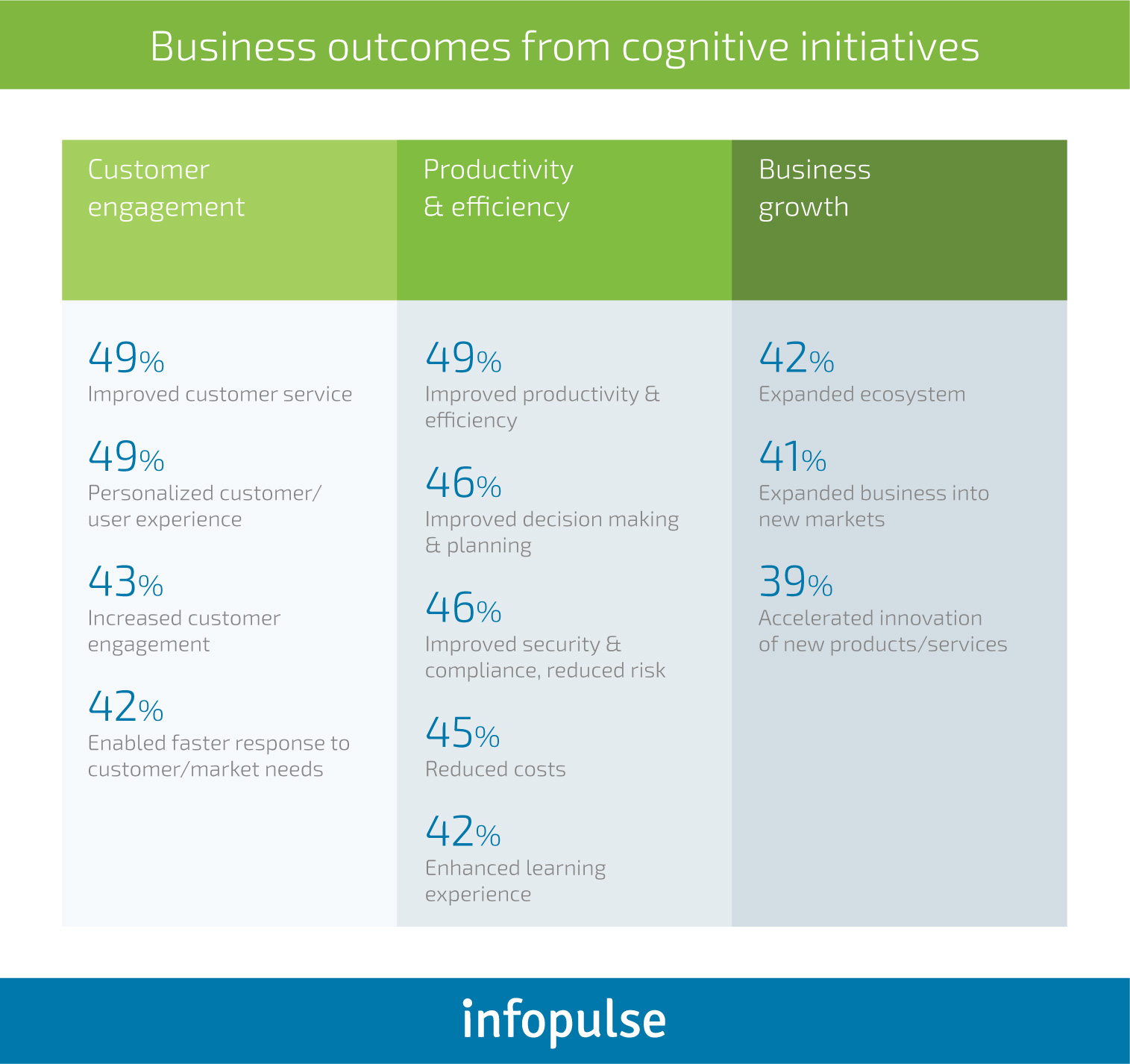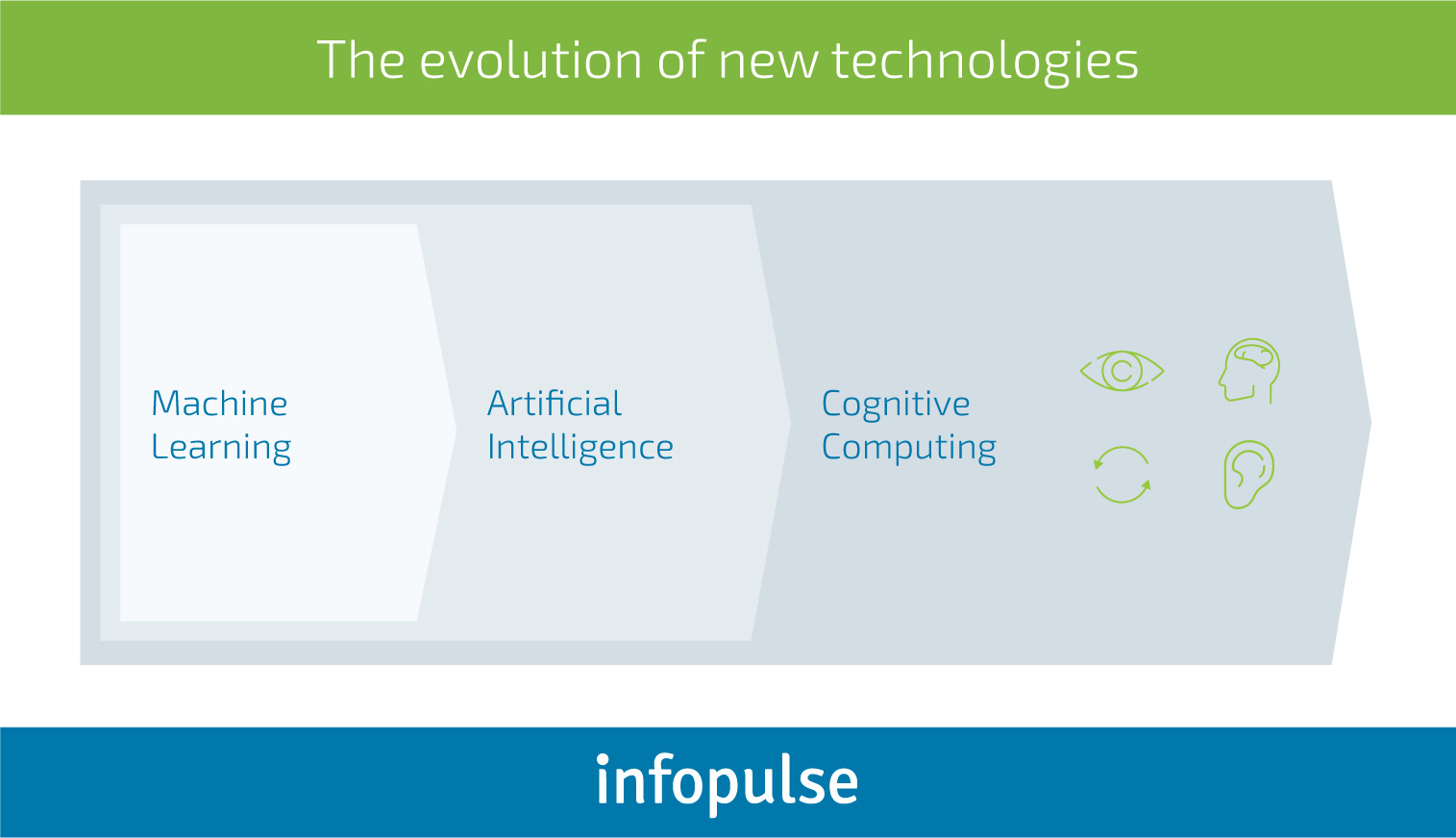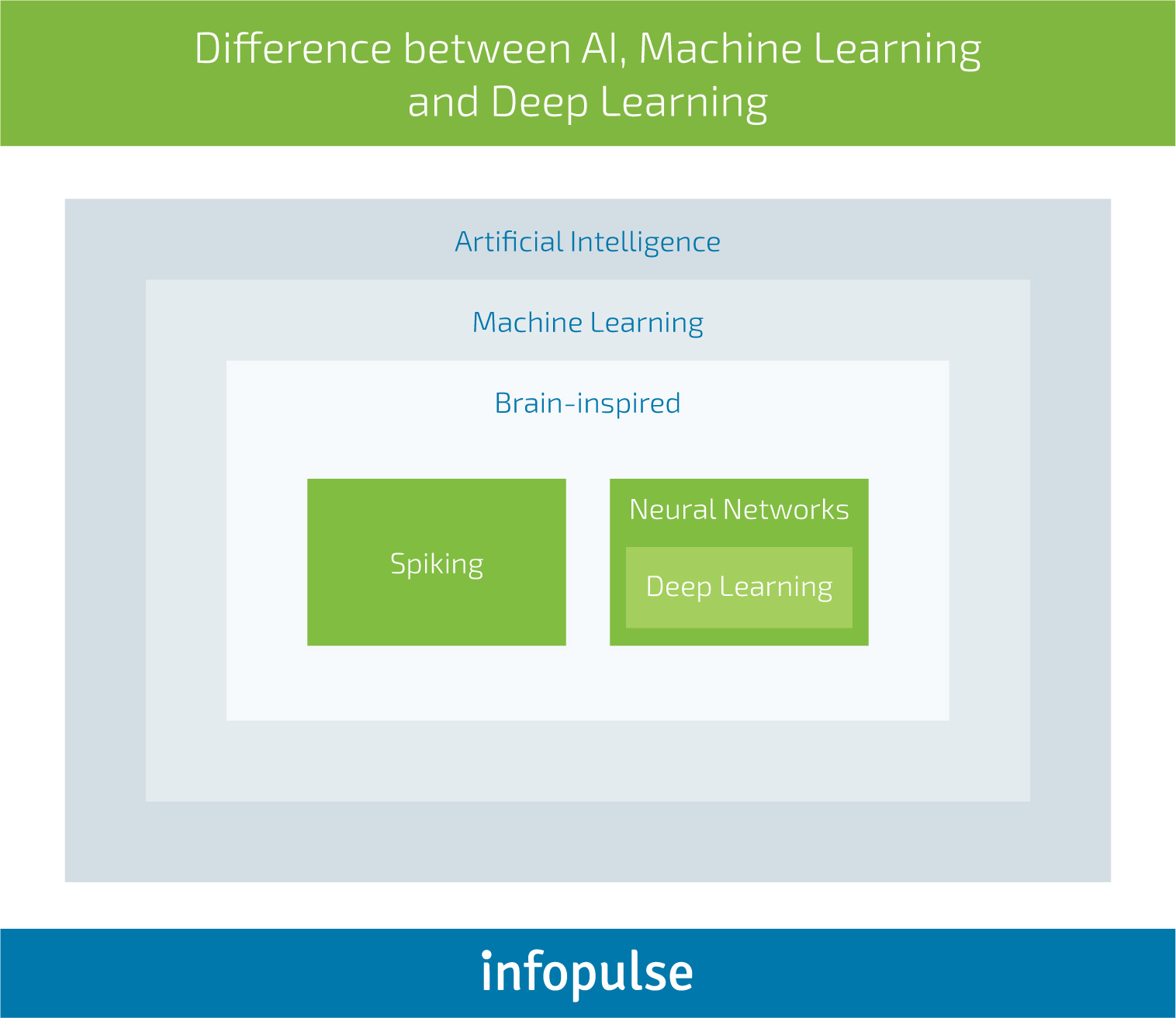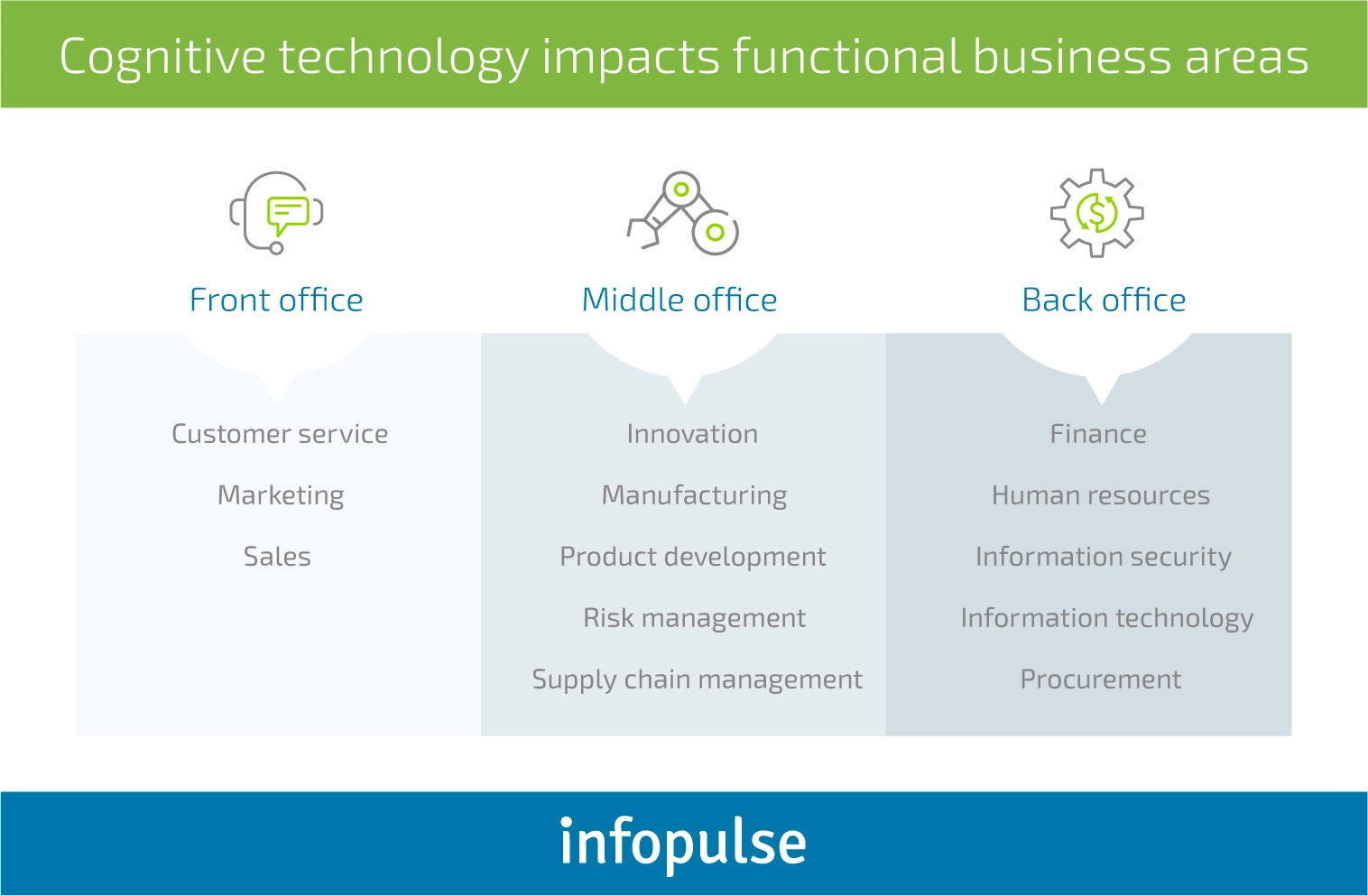How Do Businesses Tap into Cognitive Computing Systems?
Today Hal is no longer just a product of a script writer’s vision. Machine learning and deep learning, artificial intelligence and natural language processing technologies have given machines a new kind of “wits”. Algorithms can now gather both structured and unstructured data from anywhere, churn that data and answer questions about past and current trends, as well as provide insights for the future. In addition, they can continue to learn as more data and input is gathered.
We are now in the era of cognitive computing, well beyond the previous era of programming machines to do what we want. In just two years, half of all consumers will be interacting with cognitive tech on a regular basis, IBM predicts. Onward, the demand for cognitive computing services will become even stronger: the global market is expected to reach $49.36 billion by 2025.
But let’s not look further into the future and focus on what’s happening today. Early cognitive computing adopters are already seeing positive results from their investments:
- 65% of those surveyed stated that this technology has become very important in their organization’s success;
- 58% state it is critical to their overall digital transformation strategy;
- 58% say it will be crucial to remain competitive.
Moreover, those pioneering organizations are already experiencing far more customer engagement and growth.

As the data indicates, cognitive computing solutions can bring significant value across several business verticals and help companies maintain a competitive edge.
So, exactly how do businesses make use of cognitive intelligence? That’s the question we’ll tackle in this post. But first a few definitions, to clarify the terminology.
Cognitive Computing vs. Artificial Intelligence: What’s the Difference?

Machine Learning enables the computer to learn without explicitly being pre-programmed for certain actions. ML algorithms can be trained to classify data, make financial predictions or recognize human speech. The algorithms’ performance improves over time as more data becomes available. However, they do require regular input from human engineers to function smoothly and adjust to new tasks.
Artificial Intelligence is an umbrella term for the set of technologies that enable “intelligent” machine performance such as deep learning, machine learning, and natural language processing (NLP). They can thus perform cognitive functions that emulate the human mental processes – perceiving, learning, reasoning, and interacting with their environments to solve problems.

Cognitive Computing: Cognitive computing goes beyond the manual algorithms that support machine learning. Such systems consist of self-teaching algorithms that rely on data mining, visual recognition and natural language processing to solve complex problems just as humans do on a daily basis. Cognitive platforms can learn, reason and interact with humans in a natural manner.
To sum up, the key difference between cognitive platforms and artificial intelligence systems is that you use AI to have something done for you. While a cognitive platform is something you can use for collaboration or for advice.
What are cognitive computing platforms?
Several companies have already emerged as leaders in the cognitive solutions space, offering access to advanced proprietary systems, powered by deep learning, natural language processing, visual image recognition and other cutting-edge tech.
IBM Watson is the earliest and most established cognitive computing platform, capable of processing massive libraries of data to discover insights and render relevant answers to users. Watson can “think” or “reason” in a way very similar to the human brain. The platform tests a variety of hypotheses when given a query and delivers the answer in the form of a recommendation, along with confidence rankings.
As well, you can use Watson’s multi-cloud environment to build cognitive models from scratch or incorporate pre-built enterprise apps into your products. At the moment, the company offers several solutions:
- Watson Assistant – allows integrating truly intelligent conversational interfaces into any application, device, or channel; as well as develop chatbots.
- Watson Discovery – advanced cognitive search algorithm that helps companies operationalize their data and gain better business insights. Comes with embedded NLP.
- Watson Studio – a platform for building and training AI models, preparing and analyzing data.
Other cognitive services include Natural Language Understanding, Watson Knowledge Studio, Visual Recognition, Speech to Text/Text to Speech, Natural Language Classifier and Tone Analyzer.
Microsoft also recently pioneered with Cognitive Services on Azure. Their platform also allows building AI-infused apps, train sophisticated models and analyze data at an enormous scale. The platform works across multiple devices and enables businesses to seamlessly deploy new intelligent solutions with the following capabilities:
- Advanced speech recognition including the ability to identify speakers. Smart conversation transcription is a new feature currently in preview.
- Computer vision – capture and label a wide range of images.
- Language Understanding Intelligent Service (LUIS) enables developers to build custom language models, which will allow conversational apps to understand the commands and act accordingly.
Industries That Benefit the Most from Implementing Cognitive Computing Systems
There is no definitive answer to what industries can most benefit from cognitive computing, because, in short, they all can. So far, companies in the fields of healthcare, financial services, manufacturing, and even retail have been among the early adopters.
But the potential use cases of cognitive computing are virtually unlimited as such systems can be trained to perform an array of tasks humans are now in charge of. Hence, it should come as no surprise that 50% of global CEOs plan to adopt cognitive computing this year, expecting to see a 15% ROI from their investment.
So how can businesses tap into providing cognitive services? They should first determine which business functions and interactions behind those functional transformations are the most likely to create rapid evolution in organizations.

In the front office, cognitive systems can steer up customer engagement, satisfaction and retention levels by improving the company’s approach to customer relationship management. NLP-powered apps can be deployed to assist with customer service tasks or used as a new sales and marketing channel for promoting new offers. In addition, cognitive computing solutions can help sales and marketing gain more comprehensive data, and approach existing customer segments with more personalized, granular offers.
In the middle office, cognitive computing algorithms can help employees make more sense of growing volumes of data, enabling faster decision-making and improving overall efficiency. Instead of sending human analysts to deal with data management and analysis, businesses can gain access to more accurate, real-time insights produced by algorithms. They can then put those insights into immediate action to improve the business bottom lines.
In the back office, cognitive computing algorithms can take over mundane and repetitive tasks, enabling human teams to focus on higher-impact areas of business. Also, such systems can churn back office data and procure insights – afterwards, pass it on to the middle office and front office.
Below are several cognitive computing use cases illustrating how different industries approach business process transformations across aforementioned business areas.
1. Healthcare
There are several uses for cognitive services in healthcare. As a human doctor performs diagnosis and treatment protocols, AI cognitive computing can capture all relevant data and present to that doctor additional possibilities that he may not have yet considered. Obviously, this can improve patient care.
From a patient standpoint, advances in AI, machine, and cognitive tech will enhance human consideration about their own health, in the form of devices that will serve to recommend everything from customized exercise and diet protocols, essentially performing as a health and fitness avatar coach.
For instance, Lark app already leverages AI and health IoT devices to provide personalized health advice to patients with chronic illnesses; and give data-backed recommendations and responses to patients’ questions.
From a practitioner standpoint, in addition to realizing far more enhanced diagnosis and treatment capabilities, image interpretations via cognitive technology may detect things that human radiologists might miss. Machines are already capable of viewing and analyzing different types of patient images and detecting critical patterns at a scale far more superior than any human can muster.
Cognitive computing is also taking a key spot in the areas of ethics and compliance. Embedding HIPAA requirements into AI that communicates with patients, so that “rules” are not broken, as health information is transported between and among patients and multiple providers and insurance companies.
One of the greatest benefits of cognitive computing is the consolidation of knowledge bases in the cloud that AI can draw from, providing a wealth of information that will improve diagnoses and treatments. For example, when a physician in Germany develops a new cancer treatment protocol for a patient based on genome traits, a physician in North America will have access to that information.
In short, AI and cognitive technology will ultimately provide greater treatment, better decision-making on the part of providers, the consolidation of research and information for all to see, greater cost-effectiveness, patient empowerment, and improve the population health.
2. Financial Services
Banks can develop intelligent assistants (chatbots) that can handle thousands of customer inquiries every day. Using cognitive data analytics, such apps can analyze customer questions, sentiment, etc. and create its own database of most common customer interactions. One such assistant, named Cora, for the Royal Bank of Scotland, can analyze as many as 200 customer questions and comments, and provide around 1,000 distinct responses.
Cognitive computing can assist customers and banks in loan management by analyzing the loan needs of applicants and making suggestions for products. If a suitable loan product does not exist in a financial institution, then management can get to work creating one that will be more popular.
These two use cases point out an important phenomenon in the financial services industry. Banks and other financial institutions have access to voluminous amounts of data, but they still have to make use of that data to provide customized and personalized services for customers.
Data can now be collected on virtually every aspect of people’s lives because so much of that information is on the web already. Gathering that data and using it to analyze consumer behavior patterns allows financial institutions to segment populations and acquire new audiences of potential customers. They can also develop customized banking solutions – everything from types of bank accounts, to loans, to investment recommendations. All of these things have traditionally always been done manually, but that is no longer necessary. Cognitive technology can help reduce manpower and time, and result in a far more “scientific” approach to the customization of financial products and services.
Financial advisors and “relationship managers” are also beginning to use cognitive analytics to boost their expertise and be more responsive to customer needs. Virtual agents are replacing some of the functions of humans in financial services, even in some more complex areas, like mortgages and investments. This streamlines the experience of today’s consumer who praises efficiency and quickness.
Banks and other financial institutions can use cognitive analytics to make decisions on any risks and be alerted to potential fraud. For instance, Royal Bank of Canada (RBC) recently started using AI and ML to scan clients’ transaction histories and usage patterns and deliver more personalized security solutions to them. This saves their security analysts a lot of time, as well as reduces the customers’ frustration with too complex security mechanisms.
The insurance industry has also begun to make greater use of cognitive technologies. Several insurance companies have started experimenting with IoT solutions, paired with analytics services, to capture individual driving behaviors and send those directly to the company. Based on such driver ratings data, they can be altered for better or for worse. For instance, with the help of Snapshot, an IoT device developed by Progressive insurance company, 14 billion miles of driving data have been collected up to date. And most of the drivers who tested this option were offered an auto insurance discount averaging $130 after six months of use.
3. Retail
When a consumer enters a retail clothier’s website, looking for certain items, the traditional response of that site is to ask for a search query (pants, shirts, shoes, etc.). The shopper is then shown all of the catalogue items that match the general search. This is time-consuming for the customer who then must scroll through items and make selections.
This brings us to one use case of retail cognitive computing. A smart application can query the customer about the details of their need/want and then present only those specific items that meet the criteria.
North Face recently used IBM’s Watson cognitive computing technology to develop an online personalized shopper solution (XPS). The software leverages natural language processing to help customers narrow down their search and curate the most relevant recommendations.
Apart from recorded consumer responses, the app will also take several external data points into account such as:
- Past user preferences
- Customer reviews of different products
- Social media sentiment
- Weather forecasts at the shopper’s location
Afterwards, it can pitch up to 6 products that should fully meet all the customer’s requirements.
This use case is only the tip of the iceberg in the use of cognitive technology in retail and 83% of retail executives, according to an IBM survey, believe that it will have a huge impact on the industry.
Again, as in other industries, there are huge amounts of unstructured data, and when it is tapped into, churned, and analyzed, retailers can gain significant insights into customer behavior patterns and make decisions about products and customer experiences.
There are oceans of chatter on the web, and AI can capture it all. Consumers post tweets, Instagram and Facebook updates all day and night. They speak about products they have purchased, about their experiences with retailers, both on- and offline. This chatter is critical to retailers that want to capture consumers both at practical and emotional levels.
Traditionally, retailers have developed buyer personas based on demographics and then have gone after those demographics in their marketing efforts. But they can present an even greater level of personalization by tapping into all of the unstructured data out there. Using AI and cognitive computing will make sense of that data and retailers will be able to engage customers exactly where they are in terms of needs, wants, and their shopping trips. Amazon is already doing a lot of this – making suggestions and recommendations based upon previous purchases and on the purchases of others who have the same preferences as an individual customer. Smaller retailers can tap into this as well, given the availability of this new tech.
4. Manufacturing
Many manufacturers are already taking advantage of machine learning, big data and industrial IoT as part of the great shift towards Industry 4.0.
But cognitive manufacturing goes beyond that. Manufacturers can feed the data from those sensors into AI systems and retrieve predictive analyses, in order to improve their maintenance schedules and activity, for prevention purposes.
Recently, IBM’s Institute for Business Value (IBV) published a report that explored how cognitive computing can address manufacturing and production issues in electronics companies. While 70% of survey respondents have some form of IIoT either in place or planned, the 34% of them already have mature systems state and are realizing greater ROI from those implementations.
IBM has also identified four use cases for cognitive tech in manufacturing. One, cognitive maintenance, as described above. The other three involve the following:
- Cognitive Repair: when technicians can access years of historical data on machinery and equipment (life-span, performance, common repairs, repair manuals, etc.), those involved in repairs can act faster and become smarter in doing so.
- Parts Management: cognitive computing will prevent shortages in critical parts, using both predictive analysis, as well as such things as typical amounts of time for shipping, and historical frequency of parts change out.
- Improving inspections of finished products and production process: identifying defective parts; analyzing production lines and recommending reconfigurations to increase volume, allowing smarter production in less time.
Conclusions
Cognitive computing is here to stay – it is agile and robust. The possibilities for all sectors of the economy are huge and the ROI is clearly visible. Getting a strong and experienced development partner in this innovative technology will be crucial for deploying cognitive computing solutions.
Infopulse can be that partner. Our team has extensive experience in creating deep learning systems for leaders in the manufacturing space, as well as developing sophisticated Big Data analytics solutions and deploying intelligent conversational interfaces. Get in touch with us, and let’s have a discussion.

![Generative AI and Power BI [thumbnail]](/uploads/media/thumbnail-280x222-generative-AI-and-Power-BI-a-powerful.webp)
![Data Governance in Healthcare [thumbnail]](/uploads/media/blog-post-data-governance-in-healthcare_280x222.webp)
![AI for Risk Assessment in Insurance [thumbnail]](/uploads/media/aI-enabled-risk-assessment_280x222.webp)
![IoT Energy Management Solutions [thumbnail]](/uploads/media/thumbnail-280x222-iot-energy-management-benefits-use-сases-and-сhallenges.webp)

![Carbon Management Challenges and Solutions [thumbnail]](/uploads/media/thumbnail-280x222-carbon-management-3-challenges-and-solutions-to-prepare-for-a-sustainable-future.webp)

![Automated Machine Data Collection for Manufacturing [Thumbnail]](/uploads/media/thumbnail-280x222-how-to-set-up-automated-machine-data-collection-for-manufacturing.webp)

